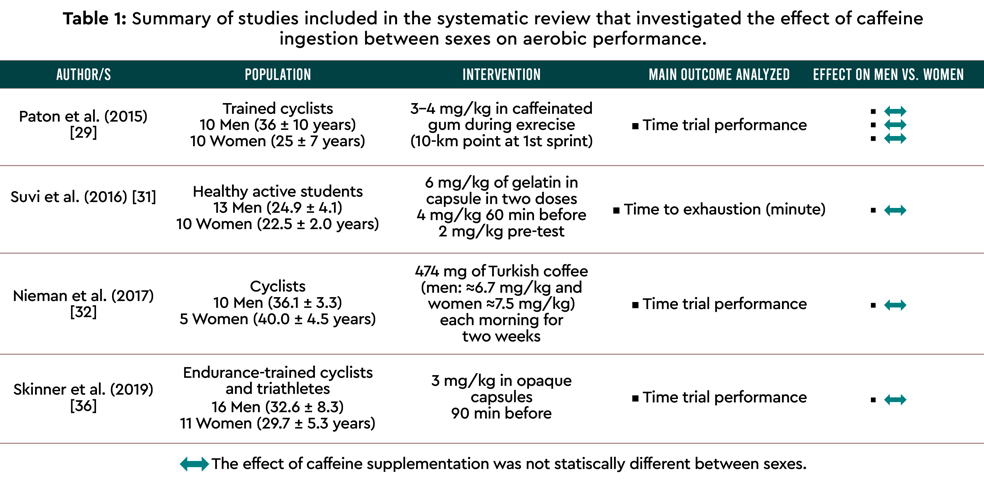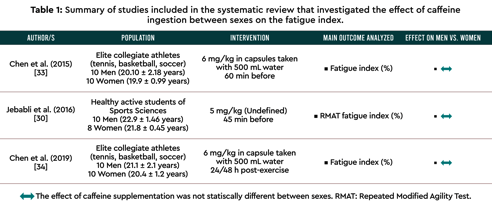Most studies that have shown the positive effects of caffeine supplementation on sports performance have been carried out on men. However, the differences between sexes are evident in terms of body size, body composition, and hormonal functioning, which might cause different outcomes on performance for the same dosage of caffeine intake in men vs women.
Only 13% of participants in investigations aimed to determine the ergogenic effect of caffeine are women, while the effect of caffeine in women at high (>9 mg/kg) or very low doses (<1 mg/kg) is unexplored.
The main aim of the systematic review study was to analyse and compare the effects of caffeine intake between men and women on sports performance to provide a source of knowledge to sports practitioners and coaches, especially for those working with women athletes, on the use of caffeine as defined as an ergogenic aid that either directly improves physiological variables associated with exercise performance or removes subjective restraints which may limit physiological capacity.
The study specifically focuses on determining the different responses between the sexes to the same caffeine supplementation protocol depending on whether the exercise will be classified as aerobic, anaerobic or when the protocol induced some type of fatigue that could be evaluated (i.e., index of fatigue – indicates the rate at which power output declines for an athlete).
The search included studies in which the effects of caffeine supplementation on athletic performance were compared between sexes. A total of 254 articles were obtained in the initial search. When applying the inclusion and exclusion criteria, the final sample was 10 articles.
RESULTS
The systematic review concluded that 4/4 investigations (100% of the number of investigations on this topic) had not found differences between sexes in terms of caffeine supplementation on aerobic performance.

Table 1: Effects of caffeine between sexes on aerobic performance 4/4 articles (100%) – no difference on effects on effects of caffeine between sexes on aerobic performance.

Table 2: Effects of caffeine between sexes on anerobic performance 4/7 articles (57.1%) showed that the effectiveness of caffeine for anaerobic performance was higher in men than women. In particular, it seems that men can produce more power, greater total weight lifted and more speed with the same dose of caffeine than women.

Table 3: Effects of caffeine between sexes on fatigue index
Fatigue index – indicates the rate at which power outputs declines for an athlete.
3/3 articles (100%) – no difference on effects of caffeine between sexes.
CONCLUSION
In summary, caffeine supplementation produced a SIMILAR ergogenic benefit for AEROBIC performance and the fatigue index in men and women athletes.
The effects of caffeine to produce more power, total weight lifted and improve sprint performance with respect to a placebo were higher in men than women athletes despite the same dose of caffeine being administered.
Specifically, the men experienced greater mean power than the women during the final 10-km cycling test after ~3-4 mg/kg caffeine. Thus, the ergogenic effect of caffeine intake on anaerobic performance might be higher in men than in women.
NEXT STEPS
In 2015, the European Food Safety Authority (EFSA) published their Scientific Opinion on the Safety of Caffeine, advising that caffeine intakes from all sources up to 400 mg per day and single doses of 200mg do not raise safety concerns for adults in the general population.
Current guidelines stated if you are looking to maximise your training and performance, it is recommended to ingest low-to-moderate doses of caffeine, ranging from 3 to 6 mg/kg, approximately 60 mins prior to exercise to get these improvements. (e.g 60 kg = 180 mg – 360 mg of caffeine per day)
Higher doses of caffeine (9-13 mg/kg) do not result in an additional improvement in physical performance and these higher doses might negatively impact and increase the incidence and magnitude of main caffeine-related side effects.
For those with the primary goal of fat loss or alertness, supplementing with a low dose of caffeine (1-2 mg/kg) may already be helpful before doing any form of aerobic exercise. (e.g.60 kg = 60 mg – 120 mg of caffeine per day).
It would be smarter to assess your personal tolerance for the substance before going to a certain higher amount of intake because it might produce danger to your health.
Use caffeine wisely, appropriately and responsibly. Remember too much of something is bad. Just what a Philosopher named Seneca said œEverything that exceeds the bounds of moderation is an unstable foundation. One day at a time.
REFERENCE
Mielgo-Ayuso J, Marques-Jimnez D, Refoyo I, Del Coso J, Len-Guereo P, Calleja-Gonzlez J. Effect of caffeine Supplementation on Sports Performance Based on Differences Between Sexes: A Systematic Review.
Nutrient.2019Sep30;11(10):2313 doi: 10.3390/nu11102313. PMID: 31574901; PMCID: PMC68835847.
